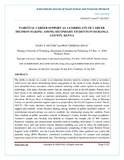| dc.description.abstract | The ability to decide on a career is an important decision made by students while at secondary school level, the choice determining future engagement in the world of work. Studies in Kenya have identified fewer secondary school students selecting viable career options in science and technology, with many choosing careers that are saturated or not in the job market. Parents have been found to be influential in students career choices and subsequently many related factors have been explored, such as parental participation, profession, social status, and level of education. However, there is inadequate documented information on studies done in Muranga County on specific parental support aspects as proposed by the Social Cognitive Career Theory (SCCT). The study therefore aimed to investigate the relationships among parental career support and students’ career decision making among students in public secondary schools. A correlational research design was used to establish the relationship among the variables. Form three students in public secondary schools in Murang’a County, formed the target population. Cochran’s sample size formula was utilized to compute the sample size of 498 students. Purposive sampling and proportionate stratified random sampling determined 11 schools which included boys, girls and mixed schools. Random sampling was used to select the participants. Quantitative data was collected using a questionnaire comprising of the Career Related Parent Support Scale (CRPSS), and the Career Decision Scale (CDS). Data gathered was coded and analyzed using SPSS. Pearson’s correlation coefficient, Analysis of variance and multiple regression analyzed the inferential data. The findings established significant positive correlations among the parent career support factors, Instrumental assistance (r(488)=0.29, p< .01), Emotional support (r(488)=0.34, p<.01)), with career decision making . The study recommended provision of the parental support factors in guiding students’ occupational choices. | en_US |

